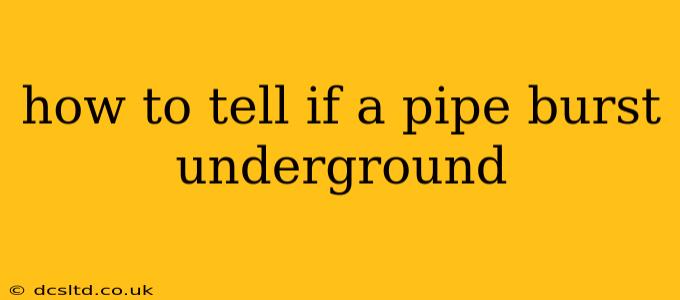A burst underground pipe can cause significant damage to your property and lead to costly repairs. Knowing the signs of a burst pipe is crucial for minimizing the extent of the damage. This guide will cover how to identify a hidden pipe burst, explore potential causes, and outline the steps to take when you suspect a problem.
Common Signs of a Burst Underground Pipe
Identifying a burst pipe hidden underground isn't always straightforward, but several telltale signs can point to a problem. Look for these indicators:
- Saturated or unusually wet soil: This is often the first visible sign. A noticeable softening or saturation of the ground in a specific area, especially if it persists even after periods of dryness, could indicate a leak.
- Water stains or discoloration on walls or foundations: If the burst pipe is near your foundation, water might seep through, causing discoloration or stains on interior walls or the foundation itself. This is especially noticeable in basements.
- Cracks in walls or floors: The pressure from escaping water can cause structural damage, resulting in cracks appearing in walls, floors, or pavement above the affected area.
- Unusual sounds: Listen carefully. You might hear a rushing or gurgling sound coming from underground, especially when water is running through your pipes. This is often more noticeable at night when ambient noise is lower.
- Unexpectedly high water bills: A sudden spike in your water bill without any changes in water usage habits could signify a significant leak somewhere in your plumbing system, possibly an underground burst pipe.
- Sinking or settling ground: A substantial water leak can cause the ground above the pipe to become unstable, leading to noticeable sinking or settling. This is a more serious indicator requiring immediate action.
- Mold or mildew growth: Consistent moisture from a leak can create an ideal environment for mold and mildew to thrive, particularly in basements or crawl spaces.
What Causes Underground Pipes to Burst?
Several factors can contribute to underground pipe bursts:
- Freezing temperatures: Water expands when it freezes, putting immense pressure on pipes. If the pipes aren't properly insulated, freezing temperatures can cause them to crack or burst.
- Corrosion: Over time, metal pipes can corrode, weakening their structure and making them more susceptible to bursting under pressure.
- Tree roots: Tree roots can grow into and around pipes, putting pressure on them and causing cracks or breaks.
- Ground shifting: Changes in soil conditions due to factors like heavy rain, drought, or construction can cause pipes to shift and crack.
- High water pressure: Excessive water pressure in the pipes can stress the pipe's structure, leading to eventual failure.
- Age and deterioration: Older pipes are more prone to leaks and bursts simply due to wear and tear.
How to Deal With a Suspected Burst Pipe
If you suspect a burst underground pipe, take these steps:
- Turn off the main water supply: This will prevent further water damage. Locate your main water shutoff valve and turn it off completely.
- Contact a professional plumber: Don't attempt to repair a burst underground pipe yourself. It's a complex job requiring specialized equipment and expertise. A professional can locate the leak, repair the pipe, and assess any resulting damage.
- Document the damage: Take photos and videos of any visible damage to your property to support your insurance claim.
- Contact your insurance company: Report the damage to your homeowner's insurance company as soon as possible to initiate the claims process.
Frequently Asked Questions (FAQ)
How deep are underground water pipes typically buried?
The depth of buried water pipes varies depending on local building codes and climate. However, they are generally buried at a depth sufficient to protect them from freezing and physical damage, typically between 18 and 36 inches.
Can I repair a burst underground pipe myself?
It's strongly discouraged to attempt DIY repair of a burst underground pipe. The work is challenging, requires specialized tools, and improper repair can lead to further damage and safety hazards. Always contact a qualified plumber.
How much does it cost to repair a burst underground pipe?
The cost of repairing a burst underground pipe varies greatly depending on the extent of the damage, the location of the pipe, the type of pipe, and the accessibility of the affected area. The cost can range from a few hundred dollars to several thousand dollars.
How do I locate a burst underground pipe?
Locating a burst underground pipe can be difficult. Professionals use specialized equipment like ground-penetrating radar or leak detection tools. If you suspect a leak, it is best to contact a plumber experienced in leak detection.
This guide provides valuable information about detecting and dealing with burst underground pipes. Remember that quick action is key to minimizing damage and costs. Always contact a qualified professional plumber for diagnosis and repair.
